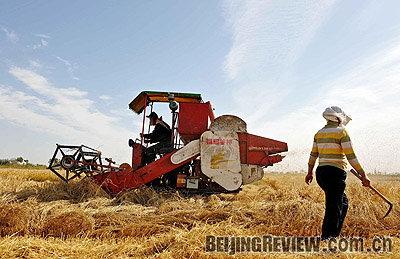| Numbers of the Week
550 million
The State Council approved a plan on April 8 to increase the country's annual grain output capacity to more than 550 million tons by 2020 from the current 500 million tons in a bid to ensure grain security.
30.3 percent
The import and export of electronic and information technology products in China dropped 30.3 percent year on year in the first two months, according to the Ministry of Industry and Information Technology.

TO THE POINT: China's economy showed initial signs of recovery, although a full revival is still far away. An array of currency-swap packages is helping the renminbi to "go global." Car sales rallied in March in quick response to the government's stimulus measures. The insurance regulator widened the channels for domestic insurers to directly invest in stock and bond markets. The Export-Import Bank of China provided a credit line to withering shipbuilders.
By HU YUE
Bottoming Out?
China's race against the economic downturns is still on, but a trickle of economic data is already fuelling expectations for the onset of an early recovery.
According to the Federation of Logistics and Purchasing, China's Purchasing Managers' Index (PMI), a key indicator of manufacturing activities, hit a 10-month record high of 52.4 in March, pointing to a marked expansion in the manufacturing sector.
The expansionary PMI is a strong signal that the economy may have found its feet in a warming business mood, said Ma Jiantang, Commissioner of the National Bureau of Statistics, in an interview with Xinhua News Agency. The aggressive government stimuli are working throughout the economy, he said.
Ha Jiming, chief economist at China International Capital Corp., was also among the optimists. In a public statement, Ha raised his forecast for the country's growth this year to 7.6-8 percent from a previous estimate of 7.3 percent, citing unprecedented credit expansion and buoyant car sales so far this year.
But it remains to be seen whether the initial recovery could turn into a prolonged trend, said Du Ying, Vice Minister of the National Development and Reform Commission, at a recent press conference.
"We should still take a cautious line and fully prepare ourselves for the difficulties ahead," he said.
Policymakers from the State Council and a number of ministries are reportedly scheduled to gather in mid-April for discussions on the current economic situation and weigh further policy responses.
Renminbi Plays up
As worries over the weakness of the U.S. dollar continue, China's currency is stepping into a bigger role in global trade.
Since last December the People's Bank of China, the central bank, has inked 650-billion-yuan ($95.1 billion) worth of currency swap contracts with six countries and regions, including Hong Kong, South Korea, Malaysia, Indonesia, Belarus and Argentina. All the arrangements are valid for three years.
With the contracts taking effect, importers in the six countries and regions can pay for Chinese imports directly in yuan, rather than the U.S. dollars, the principal foreign trade currency, so they can adequately fend off exchange risks and save transaction costs.
Analysts believe such a move would give a lift to China's exports. They also say it reflects the need for a greater use of the yuan in trade settlements. It is part of China's efforts to mitigate world recessions and stabilize global trade that is stuck in a free fall, they said.
More importantly, it bolsters the international status of the yuan and paves the way for it to go global, said Lu Zhengwei, a senior economist at the Industrial Bank Co. Ltd., in a statement.
In another move, the government announced on April 8 that it would start a pilot program that allows companies in five domestic cities, including Shanghai and Guangzhou, to settle cross-border trade deals in renminbi.
| 